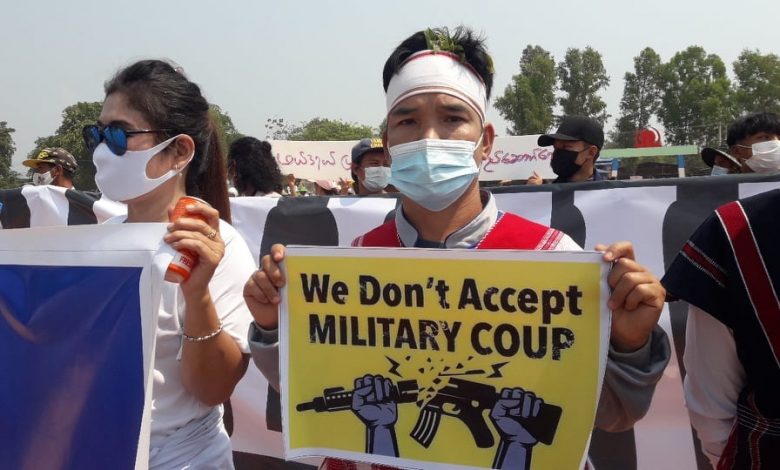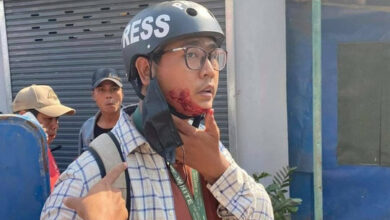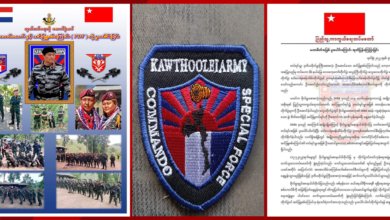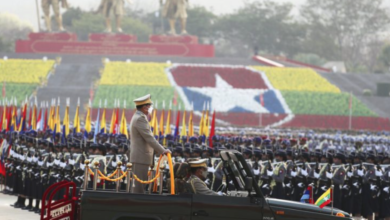International Community Must Commit to Reversing Myanmar’s Military Coup
The coup in Myanmar needs legitimacy to succeed. On Feb. 1 the military overthrew the democratically elected government and then formed its so-called State Administrative Council. In response, the public response could not have been more unanimous. Millions from different backgrounds are joining the civil disobedience movement and refusing to work while this regime is in power. Peaceful demonstrations have engulfed the country.

By *BO KYI, 25 February 2021
The coup in Myanmar needs legitimacy to succeed. On Feb. 1 the military overthrew the democratically elected government and then formed its so-called State Administrative Council. In response, the public response could not have been more unanimous. Millions from different backgrounds are joining the civil disobedience movement and refusing to work while this regime is in power. Peaceful demonstrations have engulfed the country.
But international support or at least apathy will give the regime legitimacy. The violence and lack of respect for human rights in the past show they must not succeed. The military has already received diplomatic support from China and Russia at the UN Security Council and ASEAN’s non-interference policy will be followed by most of its members.
From the regime’s point of view, China wants Myanmar as a base to threaten India and US geostrategic interests. The country is at the crossroads of south and southeast Asia and China has immense influence over ASEAN and looms large as Myanmar’s northern neighbor.
China’s Belt and Road Initiative could dominate Myanmar. It is a threat to the country and many other underdeveloped nations’ liberty. We are doubly threatened because the military has the confidence to do whatever it wants by saying it is protecting our sovereignty from external threats.
The military is following the same playbook as in 1988 with its divide and rule strategy by talking to the ethnic armed groups. It may already have signed some preliminary agreements. Some parties and individual candidates, who lost in the free and credible general election in November, have joined the regime. It is a strategy which always ends in ordinary people from ethnic minorities getting the uncomfortable end of the military’s very sharp stick.
In the assault on democracy and the National League for Democracy (NLD), the military paused fighting in some of Myanmar’s civil war. What they want is to hold onto power. The military does not care about the 2008 Constitution it took decades drafting or about following international laws like the Geneva Convention or Universal Declaration of Human Rights.
The military understands it cannot defeat State Counselor Daw Aung San Suu Kyi at the ballot box. When the military seized power, it would have expected people to demonstrate and known how to “handle them”.
The armed forces are supposed to protect the people and not rule over them through violence. We need to look for ways to destroy the culture of military coups across the world. The military says it built the country and is the only institution capable of ruling. It is likely it allowed the NLD to take power because the Constitution was so stifling and would lead to such a weak government that the military could then claim a civilian administration cannot tackle Myanmar’s issues.
The coup culture in Myanmar has allowed the military to have substantial legal and illegal financial business interests. An entire economy is under its tight control.
The military previously allowed some militias free rein to conduct business activities in the areas they control. It has also been well documented that Chinese groups work with these border guard forces and militias who declare they are fighting for self-autonomy but are actually extorting residents and setting themselves up as warlords. Both the military and militia leaders want to be governments. Violence and force have replaced democracy and become the state. If these warlords join forces there will be an even greater threat to human rights, peace and democracy.
In Shan State, this has already become a reality in many places. The Northern Alliance and Arakan Army are supported by China. The United Wa State Army has formed a small state, functionally outside the control of Myanmar’s military. It has its own currency, laws, Chinese weapons, radar and defense systems and Chinese languages are spoken.
The population in Myanmar has no peace or security. We live in a perpetual risk of violence.
My organization, the Assistance Association for Political Prisoners (AAPP), has been monitoring those detained or charged since the coup. By Feb. 24 there has been 728. There is a strong possibility this will accelerate and, like in 1988 and 2007, the military will violently crack down on young protesters who are courageously leading the civil disobedience movement if international action is not immediately taken.
My generation was also persecuted for our political beliefs. We expressed them as our inalienable rights because we desired democracy and those who survived the crackdown were imprisoned, tortured and then persecuted until they fled the country.
The main reason the military got away with it was because it was granted international legitimacy, in particular from China, Russia and ASEAN.
However, crucially, in the past we did not have legitimate leaders to mediate with the military. On Nov. 8, 2020, we elected a government and parliament. These are the elected leaders who represent us. Many were detained during the Feb. 1 coup. Some of those who were not detained have formed the “Committee Representing the Pyidaungsu Hluttaw” (CRPH), representing elected NLD members of the Union Parliament. The CRPH members, who now face arrest warrants, constitute Myanmar’s legitimate government and President U Win Myint, who is currently detained, is our legitimate leader.
Our democratic leaders and parliamentary representatives must be given international legitimacy. The military coup does not deserve a seat at the United Nations.
On Feb. 18, groups of so-called monks attacked cars carrying peaceful demonstrators. Using violence to intimidate the civil disobedience movement is part of a wider pattern of counter-coup mob violence. Equally, the 1am to 9am internet blackout is an effort to harass and subdue support for true democracy. But it is only making us stronger.
Younger activists understand the NLD won the election and they want this to be recognized. And they want an end to the illegitimate military dictatorship. Some ethnic parties are calling for the 2008 Constitution to be scrapped and a federal union to be established. There are many different views in Myanmar and these will only be reconciled in a just and democratic way.
We want accountability for the coup to ensure it never happens again.
The military will expect western countries to impose targeted sanctions and maybe it expects other forms of pressure. However, it understands the international community will find it difficult to do more.
The generals assume there will be no military intervention although the US, EU, UK and Japan may impose some additional pressure. But the non-interference policy from China and ASEAN gives cover to the military. Peace and security for residents will continue to be highly limited and our neighboring countries will also be affected and suffer as long as the military is in power.
On Feb. 20, the Peace Process Steering Team, a group of ethnic armed organizations which signed the 2015 National Ceasefire Agreement, decided to support the civil disobedience movement. It said it would try to ensure the junta does not violently crack down on protesters, help release political detainees and suspend the ceasefire agreement. Its statement demonstrates without doubt the alignment of different groups in Myanmar against the coup and an agreement on the junta’s threat to peace and security.
To prevent these threats to the peace and security of the people, the UN Security Council should deliver a sharp condemnation of this threat in a unanimous statement. This statement must be followed by diplomatic intervention in coordination with ASEAN, demanding the military returns to its barracks.
*Former political prisoner Bo Kyi is co-founder and joint-secretary of the AAPP. Bo Kyi was first arrested in 1989 for his political activism and spent most of the next decade in prison. Escaping to Thailand after his release, he called for the release of all political prisoners. Since 2013, the AAPP has been active throughout Myanmar.
**This article was first published in The Irrawaddy on 25 February 2021.




